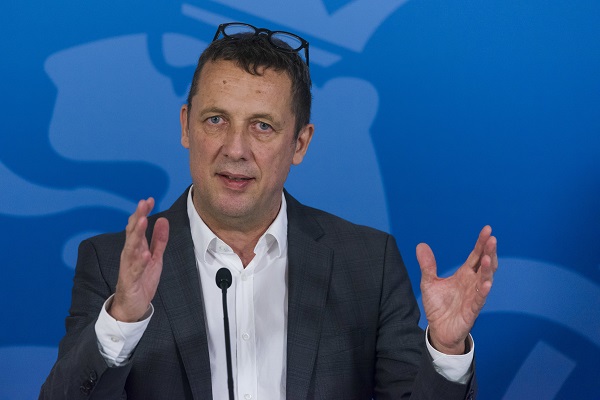 Dr. Ulf Nehrbass, LIH Director and representative of the COVID-19 Research Luxembourg Task Force;
Credit: © SIP / Jean-Christophe Verhaegen, all rights reserved
Dr. Ulf Nehrbass, LIH Director and representative of the COVID-19 Research Luxembourg Task Force;
Credit: © SIP / Jean-Christophe Verhaegen, all rights reserved
On Tuesday morning, Luxembourg’s Minister of Health Paulette Lenert and Minister for Higher Education and Research Claude Meisch, accompanied by Luxembourg Institute of Health (LIH) Director Prof. Dr. Ulf Nehrbass, held a press conference on the health and research measures foreseen as part of the COVID-19 national lockdown exit strategy.
Health Minister Paulette Lenert began by recalling that, despite a drop in the number of new COVID-19 infections, the virus is still there and so it is important to come out of the lockdown gradually. She added that the authorities are better prepared to deal with the virus than at the start of the crisis due to greater knowledge of the virus and what it means for hospital capacities and material needs.
As part of the exit strategy, the Health Minister stressed the need to continue to reduce the spread of the virus through discipline and continued social distancing, as well as carrying out additional tests in order to isolate new cases and further reduce the risk of infection. Minister Lenert also emphasised the importance of research in learning as much as possible about the virus.
In this next phase, the authorities have partnered with the Luxembourg research sector, including the University of Luxembourg, in order to monitor and interpret data. For instance the CON-VINCE study, which launched on 8 April and is led by the Research Luxembourg COVID-19 task force, has been monitoring the spread and prevalence of the virus through regular tests on a sample of the population (around 1,800 people); the project aims to give the best possible overview of the spread of coronavirus in Luxembourg.
Regarding testing, Paulette Lenert confirmed that more tests will be carried out in the coming weeks, including tests on asymptomatic individuals, in order to produce more accurate figures. The Health Minister also said that testing was carried out on a representative sample of construction workers after the reopening of the sector on 20 April 2020; the aim of such testing is to check the prevalence of the virus in different sectors.
On the subject of research, Minister Claude Meisch began by confirming that the National Research Fund has agreed to finance several research projects as part of the fight against COVID-19 in Luxembourg. He added that testing would be increased to 20,000 tests per day in order to be able to test the whole population in one month and isolate infected cases. The Education Minister recalled that more testing would mean greater freedom and activity for individuals and businesses.
Discussing the scheduled reopening of schools from next week, Claude Meisch stressed that testing among schoolchildren would be voluntary but useful in providing an overview of the prevalence of the virus. Testing starts already this week: about 6,000 high school graduates and 2,500 teachers have the opportunity to get tested before they go back to school from 4 May 2020; they will be informed by letter. Large-scale testing will be equally important, according to the minister.
Dr. Ulf Nehrbass, LIH Director and representative of the COVID-19 Research Luxembourg Task Force, then listed some of the many projects being carried out as part of the fight against COVID-19. He reiterated Minister Meisch's statement that large-scale testing was an important part of the government's exit strategy, especially in reducing the risk of a second wave of infections. He added that it was important to balance public health with economic consequences. Dr Nehrbass also confirmed that the foreseen testing capacity of 20,000 tests per day would apply from 19 May 2020.








